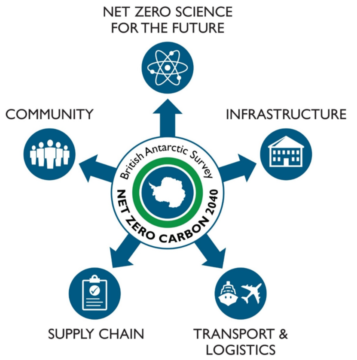Roadmap to net zero
25 January, 2023 by David Wilkins
Here at British Antarctic Survey, we recently opened our doors to over 40 companies in science, technology, and green innovation to help us make the next steps in reaching net …
The IPCC Sixth Assessment Report addresses the most up-to-date physical understanding of the climate system and climate change, bringing together the latest advances in climate science. According to the report global surface temperature will continue to increase until at least the mid-century under all emissions scenarios considered. Global warming of 1.5°C and 2°C will be exceeded during the 21st century unless deep reductions in carbon dioxide (CO2) and other greenhouse gas emissions occur in the coming decades.
British Antarctic Survey works to understand, tackle and mitigate the effects of climate change, and embed evidence in decision making and climate policy. Our scientific research programmes and Net Zero Carbon Strategy underpin the UK’s commitment to:
Our strategy is driven by our scientific research findings and is aligned to the UKRI-NERC Environmental Sustainability Strategy. We focus on five areas of activity that will help us meet our strategic goals:
Three working groups co-ordinate key areas and report progress to the BAS Executive Team:
We carry out vital scientific research on the impact of climate change in Antarctica and beyond. By replacing old inefficient infrastructure with sustainable technologies, our ambition is to reduce carbon emissions in our Antarctic stations and Cambridge office to net zero by 2040.
Given the challenges in reducing emissions from ships and aircraft, we need to work smarter. We work with these sectors to help all of us move towards net zero as quickly as possible, and have a history of innovation that we can draw on to succeed.
*Read the definitions of net zero and associated sustainability terms.
We will take the following strategic approach across the five priority areas and work in collaboration with the wider science community to decarbonise our direct operations over the next 20 years.

Director of Innovations and Impact
BAS Science Strategy Executive Group, Information Services team, Innovation team, BAS Management team, UK Polar Data Centre team, BAS Executive team
Anna Jones – Chair
Parthena Nopi Exizidou (Chair)
Julie Jupe (Co-chair)
Pilvi Muschitiello (Maternity cover: Co-Chair)
Livia Oldland (Maternity leave: Co-chair)
25 January, 2023 by David Wilkins
Here at British Antarctic Survey, we recently opened our doors to over 40 companies in science, technology, and green innovation to help us make the next steps in reaching net …
23 July, 2021 by Natalia Ford
For the inaugural Net Zero Awareness Week (17-23 July), Natalia Ford — Sustainability Manager at British Antarctic Survey, raises some of the challenges of talking about reducing carbon emissions and …
12 April, 2024
Over 120 scientists and operational professionals working for British Antarctic Survey, based in Antarctica and their headquarters in Cambridge, have received a new qualification to help the polar research institute …
3 July, 2023
British Antarctic Survey (BAS) is using Hydrotreated Vegetable Oil (HVO) for the first time on the RRS Sir David Attenborough, as an alternative to conventional diesel fuel, as part of …
5 June, 2023
British Antarctic Survey (BAS), an institute of the Natural Environment Research Council (NERC), is one of the first public sector organisations to be recognised by the Carbon Trust for its …
19 January, 2022
Scientific labs at British Antarctic Survey (BAS) in their Cambridge headquarters and at Rothera Research Station in Antarctica have achieved a sustainability award from the Laboratory Sustainability Efficiency Assessment (LEAF) …
15 December, 2021
A hackathon involving some highly innovative minds from across business and academia has resulted in the announcement of three winning entries to help decarbonise research stations for the British Antarctic …
12 October, 2021
A dramatic art installation symbolising our warming climate will be launched at the Cambridge Cleantech annual conference on 20 October as the city’s innovators and scientists gather together to brainstorm …
29 June, 2021
Immersive science-art ice core research exhibition to be displayed at Glasgow Science Centre during COP26
13 May, 2021
Award reflects project’s excellent environmental approach to biodiversity and sustainability. A new 74 metre wharf at British Antarctic Survey’s (BAS) Rothera Research Station has achieved the first CEEQUAL award in …
23 March, 2021
Construction expert BAM Nuttall, with design consultants Sweco, have won a tender for a new 10-year partnership to take forward an ambitious programme to modernise the British Antarctic Survey (BAS) …